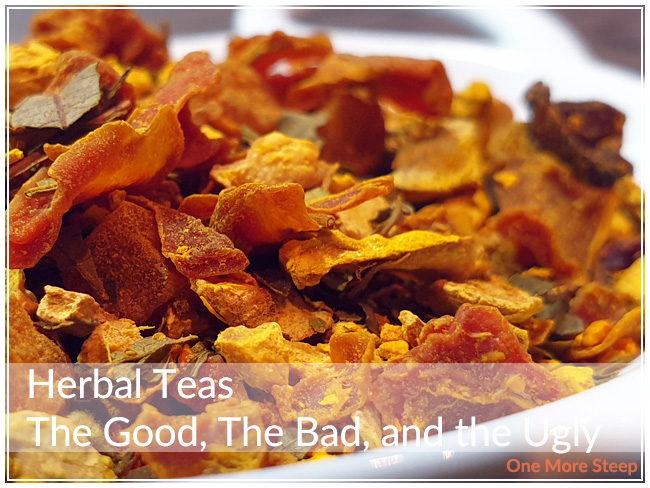
Herbal teas (tisanes – if we want to be technical) have been beloved and steeped for a long, long time. From the calming chamomile before bedtime to ginger root to soothe an upset stomach, there are many fantastic and wonderful plants that can be steeped and enjoyed. Steeping and drinking an herbal tisane isn’t without its worries – especially if you are pregnant, take any medications, or have any health issues.
While many herbs are safe – if you can properly identify the plant – there are some ones that should be avoided, under certain conditions. A lot of people will argue that herbs are natural and therefore safe – but the plague are natural too, but nobody is lining up to lick a Petri dish colonized with it. There’s a bit of good with the bad, after all!
![]()
There’s no way that I can go through each and every single herbal ingredient there is – there’s just too many! So here are some of the highlights of ingredients that you may find in some of your favourite herbal tisanes:
Ginger root is one of those herbal ingredients that I love. It has a great warming sensation when you consume it (in either tisane or food), with some great spicy notes. Ginger root traditionally helps a lot with digestion and has anti-inflammatory properties. It can also interact with anticoagulants, some antibiotics, and cardiac medications.
The most popular one to avoid is St. John’s wort. While it’s considered a medicinal herb that may have some anti-depressant properties, St. John’s wort is also highly interactive with many medications that include, but not limited to, cancer medications, contraceptives, antivirals, and anticoagulants. There’s a very long list of medications that it can interact with, so really it’s just best to avoid St. John’s wort completely if you take any sort of medication.
Another digestion aid, hawthorn, is popular in traditional Chinese medicine and indigenous medicine (although, they do use different species of hawthorn). Hawthorn is actually an ingredient in a popular Chinese snack (haw flakes), but hawthorn consumption has been known to interact with digoxin (a cardiac medication), and can also cause hypotension (low blood pressure) and cardiac arrhythmia (where your heart is either beating too fast, too slow, or irregularly). It’s an ingredient I’d definitely have a chat with your health care professionals about, especially if you have any heart or blood pressure issues.
Valerian root is used as a sleeping aide – it is frequently an ingredient in sleepy time teas. But valerian should be avoided if you have any liver issues, or with alcohol and some prescription medications (best check with your friendly neighbourhood pharmacist!).
For those who love licorice root, you know that it’s found in a variety of candies – and can be delicious, I personally don’t think that licorice root tastes like the candy at all. Licorice is one to avoid in pregnancy, and it can actually cause hypertension (high blood pressure) as well as hypokalemia (low potassium) and edema (water retention). Which, if you’ve ever been pregnant, you already know you’re going to have some water retention, so why would you want to exacerbate it?
![]()
When in doubt about an herbal ingredient in your tisanes, I would recommend following up with your physician or pharmacist – especially if you are pregnant, taking any medications (prescription or otherwise), taking supplements, or have any health concerns.